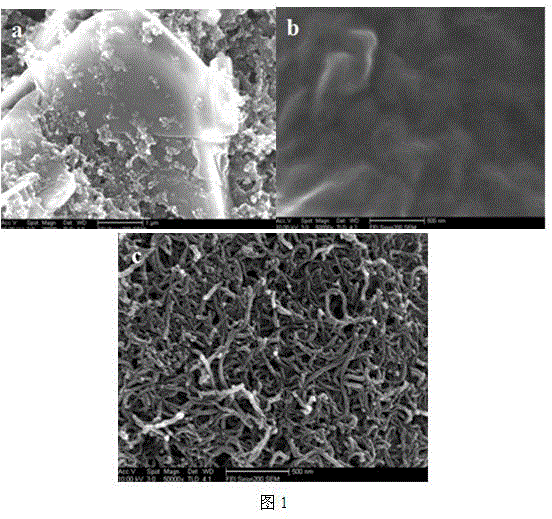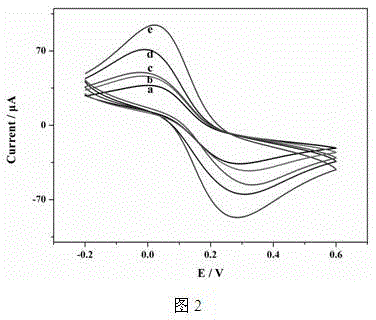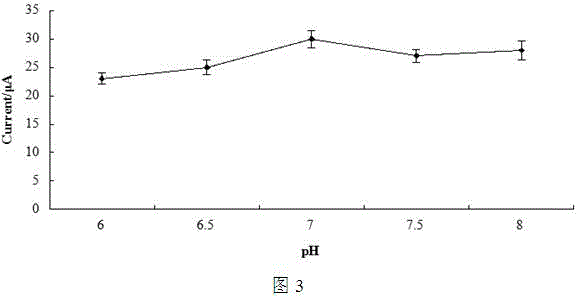Preparation method and application of sensor based on screen-printed carbon electrode
A technology of screen printing and carbon electrodes, which is applied in the field of biosensors, can solve the problems of low residue and quantitative detection, inaccurate detection results, and the influence of spectrophotometry, etc., and can be mass-produced at cost, with high stability and sensitivity , design flexible effects
- Summary
- Abstract
- Description
- Claims
- Application Information
AI Technical Summary
Problems solved by technology
Method used
Image
Examples
Embodiment 1
[0055] Embodiment 1: A kind of sensor preparation method based on screen printing carbon electrode
[0056] (1) Cleaning of the screen-printed carbon electrode before the preparation of the amperometric acetylcholinesterase sensor, place the screen-printed carbon electrode in 1mM NaOH solution for 5 min, rinse with ultrapure water, and N 2 blow dry. Afterwards, the electrode was placed in 1mM HCl solution for 5min sonication, rinsed with ultrapure water, N 2 blow dry. Finally, rinse the electrode with ethanol, N 2 blow dry;
[0057] (2) Activation of the electrode before the preparation of the amperometric acetylcholinesterase sensor, scanning the current-time curve for 300s in pH 5.0 phosphate buffer, and then scanning the cyclic voltammetry curve until the performance is stable;
[0058] (3) Preparation of dicyclohexyl phthalate / multi-walled carbon nanotubes, adding 0.1g chitosan to 50mL concentration of 1.0% acetic acid solution to form a 0.2% chitosan solution, magneti...
Embodiment 2
[0060] Example 2: Using the prepared amperometric acetylcholinesterase sensor to detect vegetable samples
[0061] (1) The acetylcholinesterase sensor prepared according to Example 1 was subjected to a cyclic voltammetry test at a scan rate of 50 mV / s in a phosphate buffer solution of pH 7.5 containing 1.0 mM thioacetylcholine chloride (ATCl), The potential window is 0V~1.0V;
[0062] (2) Prepare chlorpyrifos standard solution. When measuring pesticides, immerse the above-mentioned acetylcholinesterase sensor in different concentrations of pesticide standard solutions for 10 minutes, and then add 15~20mL of chlorpyrifos containing 1.0mM thioacetylcholine chloride (ATCl) to the reaction pool. Phosphate buffered saline, carry out cyclic voltammetry scan, and inhibition rate I can be obtained by following formula:
[0063] I(%)=(I P, control ?I P, exp ) / I P, control ×100%
[0064] where I P, control and I P, exp Respectively, the peak current of the modified electrode in t...
PUM
 Login to View More
Login to View More Abstract
Description
Claims
Application Information
 Login to View More
Login to View More - R&D
- Intellectual Property
- Life Sciences
- Materials
- Tech Scout
- Unparalleled Data Quality
- Higher Quality Content
- 60% Fewer Hallucinations
Browse by: Latest US Patents, China's latest patents, Technical Efficacy Thesaurus, Application Domain, Technology Topic, Popular Technical Reports.
© 2025 PatSnap. All rights reserved.Legal|Privacy policy|Modern Slavery Act Transparency Statement|Sitemap|About US| Contact US: help@patsnap.com



